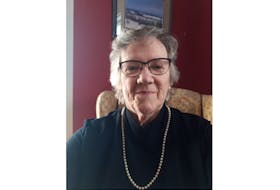This week, we're profiling five very special Maritime families who have children with rare genetic disorders. This is the third article. Read more about the series by Lifestyles editor Jen Taplin here.
TRURO, N.S. — One-year-old Maddie Jackson is lying on the couch in her Truro home, her gastrostomy (G) tube hooked up to her feeding machine. She’s making cute baby sounds, interrupted by the odd cough because she’s incapable of swallowing her own saliva.
Her parents, Eric and Brittany Jackson, sit beside her, exhausted.
These 20-something first-time parents are talking about the worst day of their life, about no sleep, crushing financial costs and blindly feeling their way through a complicated health-care system.
It’s all heavy and heartbreaking, until ...
“When she’s well, she’s such a happy little girl,” says Eric, lighting up like any proud new dad asked to describe his daughter.
“We’re on a Beethoven kick right now ... she’ll just tune right in and she’s listening and you’ll see this smile creep up.”
Her other big joy is petting their dogs, Silas and Cleo, or gazing at the fish inside the IWK Health Centre’s aquariums. Since she was four months old, she’s spent more time at the IWK than at home.
“Honestly, that’s all that keeps me going, that I know my little girl is in there,” Eric says.
They hope they can find the right treatment to get Maddie’s development back on track.

Darkest day
Maddie was born Feb. 4, 2019, and the pregnancy and birth were uneventful. Everything was ticking along until Maddie was about four months old.
“The darkest day of our lives was the last day of May,” says Eric.
“We were sitting here, just watching TV and eating dinner, and she was sitting on a chair right next to the couch and her legs started twitching. It was like a strange, repetitive bit of a kick almost. We made a note of it and took a video but we didn’t think too much about it, but the next morning she did it again.”
They took her to the emergency room, where they were told it was a seizure and were sent off to the IWK Health Centre in Halifax.
One of the most important tests they ran was an EEG, which scans brain activity. It found Maddie had abnormal patterns, which led doctors to believe she has a genetic disorder.
“That for us was a real shocking, horrible moment because two days ago we had our healthy baby at home and now we’re in the hospital and they’re talking that there’s something terribly wrong and they’re having discussions about whether your baby will ever walk, what her lifespan will be like,” Eric says.
The seizures got worse, and by the end of that week, Maddie was having convulsive seizures for five to 10 minutes at a time.
“We were just totally helpless, absolutely helpless,” he says.
Symptoms but no diagnosis
MRIs found Maddie is missing her corpus callosum, a band of nerve fibres that provide the fastest way to connect the left and right hemispheres of the brain. Some people can live long lives without it but in Maddie’s case, Eric explains, it is likely symptomatic of something else.
They know something genetically is wrong, but Maddie doesn’t have a specific diagnosis. She has a genetic mutation of the COL4A1 gene, but they’re unsure if it is causing all her symptoms. There’s no cure, so all Eric and Brittany can do for their daughter is try to bring down her seizures (she has between two and 200 a day) with medications and a ketogenic diet, which is used primarily to treat epilepsy in children, and make her life as comfortable as possible.

Their lives have turned upside down. Brittany quit her job as a nanny, and Eric (a marketing manager) hasn’t worked a full week since their “darkest day.” He’s thankful his employer has been compassionate, but finances have taken a huge hit since almost every medication claim he’s filed through his insurance has been denied. They lean heavily on donations from their church, family, programs through the IWK and a GoFundMe campaign.
“It was reshaping your life to make having a sick child more manageable, but there comes a day when there’s nothing more you can do and you just need to sit there and watch your child suffer,” Eric says.
“Here’s another seizure you can’t control and here’s another episode you can’t stop.”
Every moment for Maddie
They spend every moment caring for Maddie or making phone calls and sending emails on her behalf. Brittany says they have no hobbies, the dogs barely get walked anymore and any spare time is spent catching up on sleep (babies with seizures don’t sleep well).
“It’s a six-person job, and there’s just the two of us to do it,” she says.
But connecting with families like the Langilles in Truro who have a seven-year-old daughter with a rare genetic disorder, has been a lifeline.
“I couldn’t do it without them, honestly. Kristen (Langille) has been amazing and she’s so open with her story and it’s been so helpful,” Brittany says.
The genetic disorders are different, she adds, but their symptoms and journeys are very similar.
“If the worst thing is having a sick kid and the unknown for her future,” Eric says, “the second worse thing is navigating the bureaucracy and the third worse thing is the isolation. Having those Facebook groups and interacting with other parents at least solves your second and third worst problems.”
This young family has plenty of advice for others: “The system will fail you and if you don’t advocate for your child constantly, if you’re not the squeakiest wheel, you will not get the treatment your child deserves,” Eric says.
Brittany nods in agreement, adding a few more practical tips like leaving a packed suitcase by the door in case you need to call 911.
“And bring a pillow to the hospital.”
Read more about our series here.
Part One, The Gardiner family: ‘Nature chose her.’ Toddler faces 40+ surgeries in her lifetime
Part Two, The Langille family: Little Georgia has the rarest of disorders. ‘We just do the best we can.’







